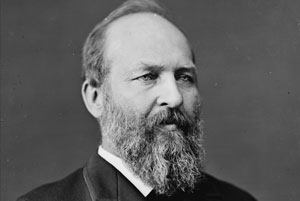1881

The "preacher president," Garfield converted to Christianity at a camp meeting in 1850. The next day he was baptized in the Disciples of Christ Church. "Today I was buried with Christ in baptism and arose to walk in the newness of life," he wrote.
Though not formally a minister, Garfield preached until becoming a member of Congress in 1863. One of his most famous sermons, "The Material and the Spiritual," presented Christianity as a remedy to what he saw as a growing materialism: "Men are tending to materialism. Houses, lands, and worldly goods attract their attention, and, as a mirage, lure them on to death. Christianity, on the other hand, leads only the natural body to death, and for the spirit, it points out a house not built with hands, eternal in the heavens."
Later in the sermon, Garfield described the Jesus he believed in: "Let me urge you to follow Him, not as the Nazarene, the Man of Galilee, the carpenter's son, but as the ever living spiritual person, full of love and compassion, who will stand by you in life and death and eternity."
When Garfield became president, he left his position as an elder in the church saying, "I resign the highest office in the land to become president of the United States."
A fierce advocate of the principle of separation of church and state, Garfield spoke in his inaugural address about the danger that the Church of Jesus Christ of Latter-day Saints posed, having established what many saw as a theocracy in the Utah Territory. "The Constitution guarantees absolute religious freedom," he said. "Congress is prohibited from making any law respecting an establishment of religion or prohibiting the free exercise thereof. The Territories of the United States are subject to the direct legislative authority of Congress, and hence the General Government is responsible for any violation of the Constitution in any of them. It is therefore a reproach to the Government that in the most populous of the Territories the constitutional guaranty is not enjoyed by the people and the authority of Congress is set at naught. The Mormon Church not only offends the moral sense of manhood by sanctioning polygamy, but prevents the administration of justice through ordinary instrumentalities of law. In my judgment it is the duty of Congress, while respecting to the uttermost the conscientious convictions and religious scruples of every citizen, to prohibit within its jurisdiction all criminal practices, especially of that class which destroy the family relations and endanger social order. Nor can any ecclesiastical organization be safely permitted to usurp in the smallest degree the functions and powers of the National Government."
Garfield was assassinated 100 days after taking the oath of office.

The "preacher president," Garfield converted to Christianity at a camp meeting in 1850. The next day he was baptized in the Disciples of Christ Church. "Today I was buried with Christ in baptism and arose to walk in the newness of life," he wrote.
Though not formally a minister, Garfield preached until becoming a member of Congress in 1863. One of his most famous sermons, "The Material and the Spiritual," presented Christianity as a remedy to what he saw as a growing materialism: "Men are tending to materialism. Houses, lands, and worldly goods attract their attention, and, as a mirage, lure them on to death. Christianity, on the other hand, leads only the natural body to death, and for the spirit, it points out a house not built with hands, eternal in the heavens."
Later in the sermon, Garfield described the Jesus he believed in: "Let me urge you to follow Him, not as the Nazarene, the Man of Galilee, the carpenter's son, but as the ever living spiritual person, full of love and compassion, who will stand by you in life and death and eternity."
When Garfield became president, he left his position as an elder in the church saying, "I resign the highest office in the land to become president of the United States."
A fierce advocate of the principle of separation of church and state, Garfield spoke in his inaugural address about the danger that the Church of Jesus Christ of Latter-day Saints posed, having established what many saw as a theocracy in the Utah Territory. "The Constitution guarantees absolute religious freedom," he said. "Congress is prohibited from making any law respecting an establishment of religion or prohibiting the free exercise thereof. The Territories of the United States are subject to the direct legislative authority of Congress, and hence the General Government is responsible for any violation of the Constitution in any of them. It is therefore a reproach to the Government that in the most populous of the Territories the constitutional guaranty is not enjoyed by the people and the authority of Congress is set at naught. The Mormon Church not only offends the moral sense of manhood by sanctioning polygamy, but prevents the administration of justice through ordinary instrumentalities of law. In my judgment it is the duty of Congress, while respecting to the uttermost the conscientious convictions and religious scruples of every citizen, to prohibit within its jurisdiction all criminal practices, especially of that class which destroy the family relations and endanger social order. Nor can any ecclesiastical organization be safely permitted to usurp in the smallest degree the functions and powers of the National Government."
Garfield was assassinated 100 days after taking the oath of office.
No comments:
Post a Comment